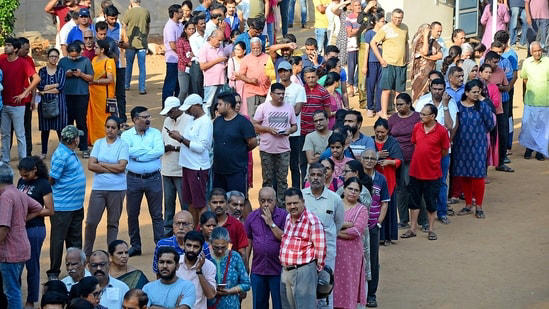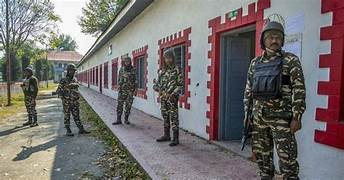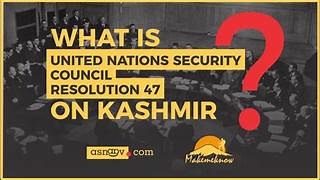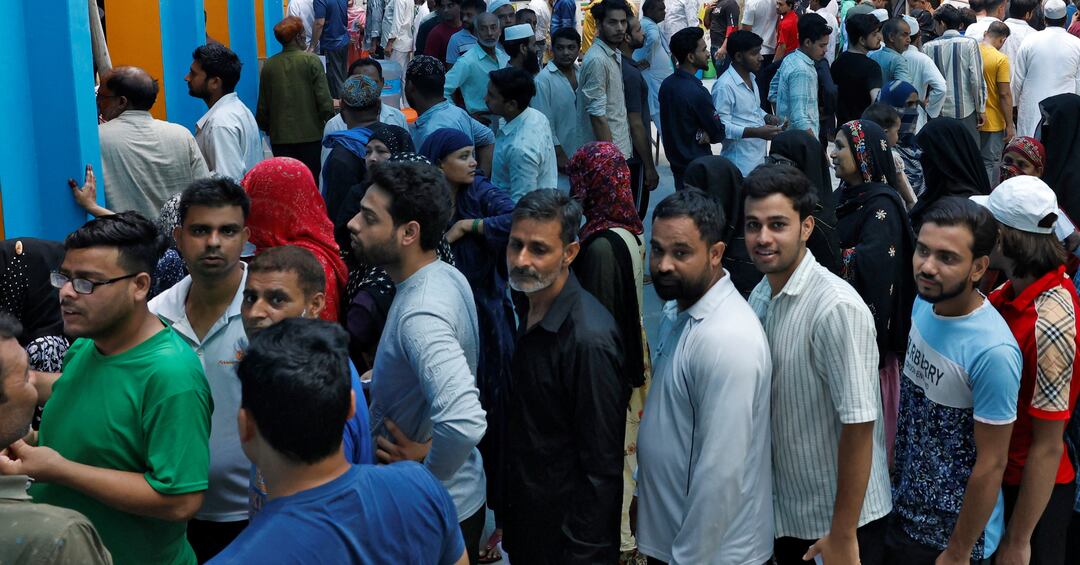DESIBUZZCanada
Events Listings
Dummy Post

International Day Of Yoga To Be Virtually Celebrated Saturday At 4pm

CANCELLED: Coronavirus Fears Kills Surrey’s Vaisakhi Day Parade

ADVERTISE WITH US: DESIBUZZCanada Is The Most Read South Asian Publication Online

SURREY LIBRARIES: Get Technology Help At Surrey Libraries

WALLY OPPAL: Surrey Police Transition Update On Feb. 26

GONE ARE THE DAYS - Feature Documentary Trailer

Technology Help At Surrey Libraries

Birding Walks

Plea Poetry/short Story : Youth Contest

International Folk Dancing Drop-in Sessions
Higher Voter Turnout In 2024 A Rejection Of Modi's Policies In Kashmir, Says World Kashmir Awareness Forum
- June 12, 2024

By Dr. Ghulam Nabi Fai
Secretary General - World Kashmir Awareness Forum
While the hullabaloo over Parliamentary elections in Indian occupied Kashmir has been on the verge of being a circus, with all the elephants of election sloganeering on parade, like, Prime Minister Modi's tweet, "The abrogation of Article 370 has enabled the aspirations of the people (of Kashmir) to find full expression."
And Amit Shah's tweet, "The Modi government's endeavours to ensure peace and development in Kashmir have strengthened people's trust in democracy."
But the analytical observation on the ground shows that the higher voter turnout was the reflection of the rejection of Modi's colonial and antidemocratic ways in Kashmir. Such sloganeering was also a distraction from the basic and fundamental right, pledged by both India and Pakistan and upheld by the world community – the right of self-determination given to the people of State of Jammu & Kashmir to decide the future status of its territory.
There is no doubt that the authority of any government can only derive from the will of the people as expressed in truly free and fair elections held in regular intervals on the basis of universal, equal and secret suffrage. Elections must meet legitimate standards based on internationally accepted and prescribed procedures for voter registration, election campaign and ballot secrecy. It is a fact the election or referendum in Kashmir has to be conducted, monitored and supervised by an impartial and neutral agency, like the United Nations. Unfortunately, the elections in Indian Occupied Kashmir do not meet this threshold and are therefore, illegitimate as a vehicle to move forward any talks even as a first step towards the resolution of Kashmir dispute.
The world powers know that the Government of India's election plans have nothing to do with building a majority consensus in Kashmir. They are designed to legitimize its illegitimate rule in the eyes of the international community.

It is worth mentioning here that the United Nations Security Council has denounced the "subterfuge" of elections in a 1957 resolution # 122. It reminded the concerned governments and authorities "of the principle embodied in its resolution that the final disposition of the State of Jammu and Kashmir will be made in accordance with the will of the people expressed through the democratic method of a free and impartial plebiscite conducted under the auspices of the United Nations." The resolution further elaborated that "the convening of a Constituent Assembly...and any action that Assembly may have taken or might attempt to take to determine the future shape and affiliation [of Kashmir]" would be no surrogate for Kashmiri self-determination.
Now, let us analyze the current parliamentary election in Kashmir on the basis of the interviews conducted by neutral news agencies on the day of voting at various polling booths.
Anando Bhakto reported in Virginia, United States based 'The Diplomat' on May 23, 2024 that, "But people described the import of the elections in stark and chilling terms: a demonstration of their anger over the New Delhi-controlled, bureaucratic power apparatus, which is administering J&K in the aftermath of August 5, 2019, when India's Bharatiya Janata Party (BJP) government revoked J&K's special status by a presidential proclamation.

The Diplomat further wrote that, "In Sopore, Aaqib, a teacher in his late 20s, averred: "We vote to reverse everything that August 5, 2019, effected in our lives: stifling of dissenting viewpoints by relentless use of anti-terror laws, an affront to our religious sentiments, and the fear of a demographic reorientation." His companions share his vexation that the world around them is crumbling under the strain of the BJP's Hindu majoritarian politics. Their vote is their instrument to convey their accumulated anger and loss of hope.
Same sentiments were echoes in Economic Times on May 27, 2024 when it interviewed Sahil Parvez of Janbazpora who said, "We want to send a message to New Delhi that we are not happy with the decisions of August 5 2019, and what has happened in the Valley since." It added "That is no endorsement of India or its policies, say voters and local politicians. Instead, they say, it is a reflection of a dramatically changed political landscape in the region that they feel has left them with no other option to show their dissent against New Delhi.
Al Jazeera quoted Parra saying that, "People have now realised that [their] vote is a weapon," "Today, there is a complete silence in Kashmir. People are even afraid of talking, but by participating in the elections, they have conveyed their dissent to New Delhi's 2019 decision."

Bashir said, referring to fears that the BJP is trying to change the demographics of the Muslim-majority region by allowing people from other parts of India to buy land, take up jobs and settle in Kashmir.
Al-Jazeera interviewed Rukhsana, a 30-year-old voter from the village of Naira in south Kashmir, who said her vote would help to release jailed youth in her village. "There are lots of atrocities taking place in Kashmir. Our youth are jailed. I am sure if we have our people at the helm of affairs, our miseries will lessen," she said.
According to the Election Commission of India data, Engineer Rashid was winning the seat in Baramullah constituency with a margin of over 200,000 votes, defeating former chief minister of Kashmir, Omar Abdullah and BJP supported candidate, Sajad Lone. His election campaign was also designed to reject anti-terror laws enacted by Modi administration in Kashmir. Most of his campaigners projected him as the victim of "India's cruelty." Their election slogan was "Jail ka badla vote se lenge" (The best revenge of jail is through vote).
If my vote helps in Engineer's release, that is enough reason for me,"AlJazeera quoted a voter saying on May 16, 2024

Engineer Rashid has earlier made it clear that he stands for a referendum in Kashmir. It is reported in the local newspapers that in 2015, Engineer Rashid generated a big controversy when he raised the slogan of 'Rai Shumari' (Plebiscite to determine J&K's future in accordance with the United Nations Security Council resolutions of 1948 and 1949). The BJP MLAs confronted him fiercely while alleging that Rashid was promoting Pakistan's, the separatists' and the terrorists' narrative inside the state legislature. His "Raishumari" slogans added to his popularity among sections of the valley's younger generation which nourished and cherished the dreams of 'azadi'.
If world powers would like to pursue the commitment that it has given to the people of Kashmir, then the referendum is the only way out.
It can take place provided: (1) there is the demilitarization of the State of Jammu & Kashmir on either side of the Cease-fire Line; (2) an atmosphere of peace and security is created; (3) all draconian laws, including Domicile Law which is designed to change the demography of Kashmir is annulled; (4) all political prisoners, including Mohammad Yasin Malik, Shabir Ahmed Shah, Masarat Aalam Bhat, Aasia Andrabi, Nahid Fehmida, Sofi Nasreen, Khurram Parvaiz and others are released immediately and unconditionally; (5) the rights of peaceful association, assembly and demonstrations are restored; (6) any solution must satisfy democratic principles, the rule of law, and security for every inhabitant of Kashmir, irrespective of their religious affiliations; (7) an international and neutral team is deputed to conduct the referendum.
In conclusion, Kashmir's suffering is a rebuke to the United Nations for its inaction. The situation is a call on the conscience of the members of the Security Council, particularly to the United States.
Dr. Fai is also the Chairman, World Forum for Peace & Justice. He can be reached at: WhatsApp: 1-202-607-6435 or gnfai2003@yahoo.com











